Serhiy Pavlov from Kryvyi Rih could have avoided fighting. When the full-scale invasion began, he and his beloved woman had already been living in Poland for several years. However, in the early days of the war, Serhiy returned to Ukraine and volunteered.
Currently, the veteran is classified as having a moderate disability due to an injury sustained to his left arm on the front line. He works as a driver in the automotive department at Metinvest Group’s Inhulets Iron Ore facility. He got the job after demobilisation in March, having found the advertisement online. It is currently one of the few jobs he can do, as he has only partial use of his arm.
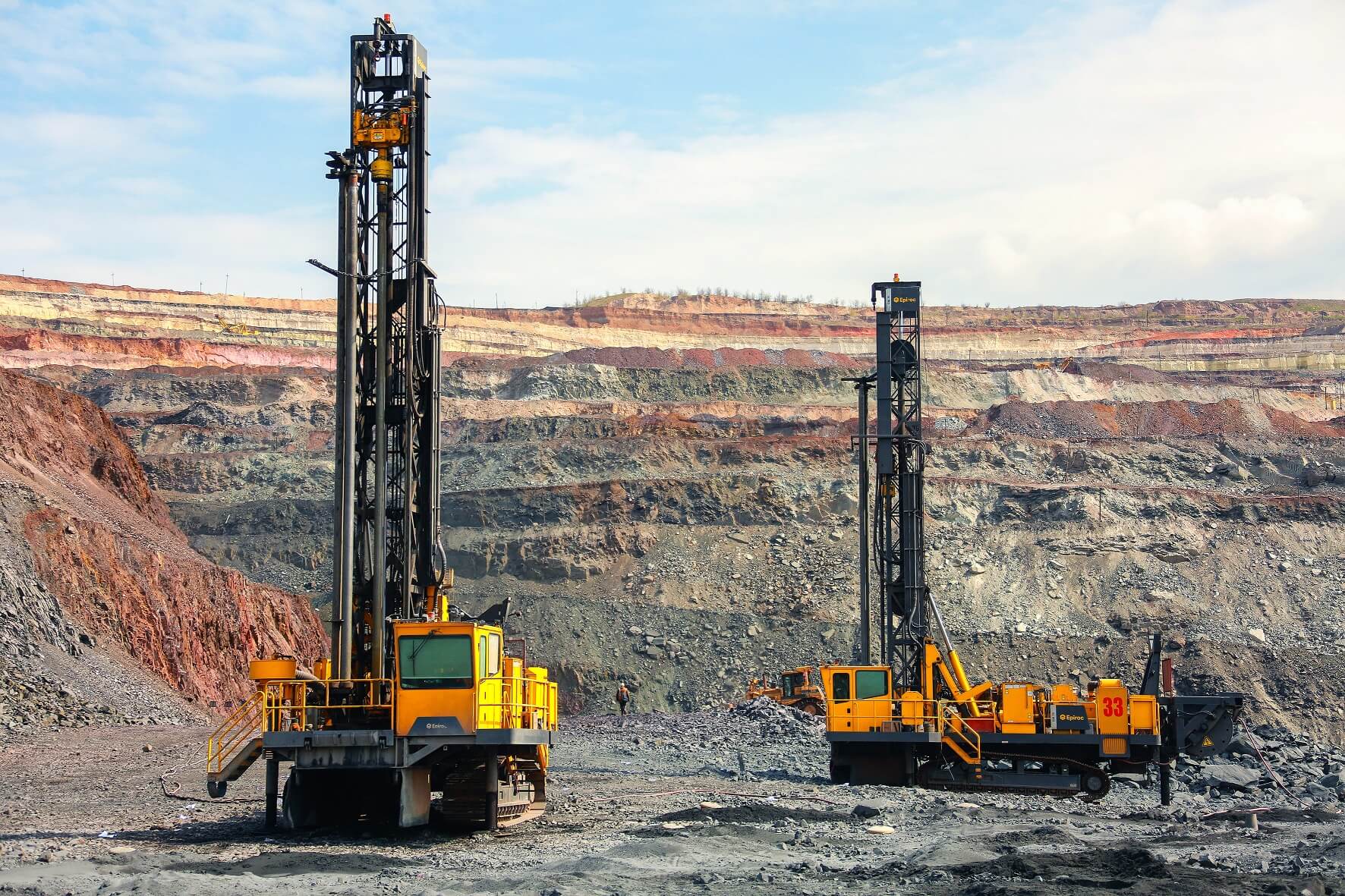
Inhulets Iron Ore
Inhulets Iron Ore is Kryvyi Rih’s youngest iron ore mining and processing plant. It was commissioned in 1965 after four years of construction. Since then, the enterprise, which extracts and processes ferruginous quartzites from the Inhulets deposit, has become one of Kryvyi Rih’s main employers. Today, Inhulets Iron Ore is part of Metinvest Group’s Mining segment.
From abroad to war
Serhiy is from Inhulets, a town that was a separate settlement until 2002 and is now part of Kryvyi Rih. Serhiy has had various work experiences, including being an excavator operator. He had a period of prior service in the army, after which he graduated from Vinnytsia Higher Vocational School of the Police Department and worked in the cash collection service for almost seven years, followed by private security.
From 2017 to 2022, Serhiy worked installing water and gas utility lines in Poland. As the veteran recalls, nobody that he knew had been talking about the possibility of war in Ukraine on the eve of the full-scale invasion. However, a relative who also came to Poland said that war was likely.
“A relative visited about two months before the invasion. He’s a veteran, and he had to report to his unit anyway. I told him to take me with him. At that point, I already understood that in case of war, I had to return home and do something useful for the country,” Serhiy recalls.
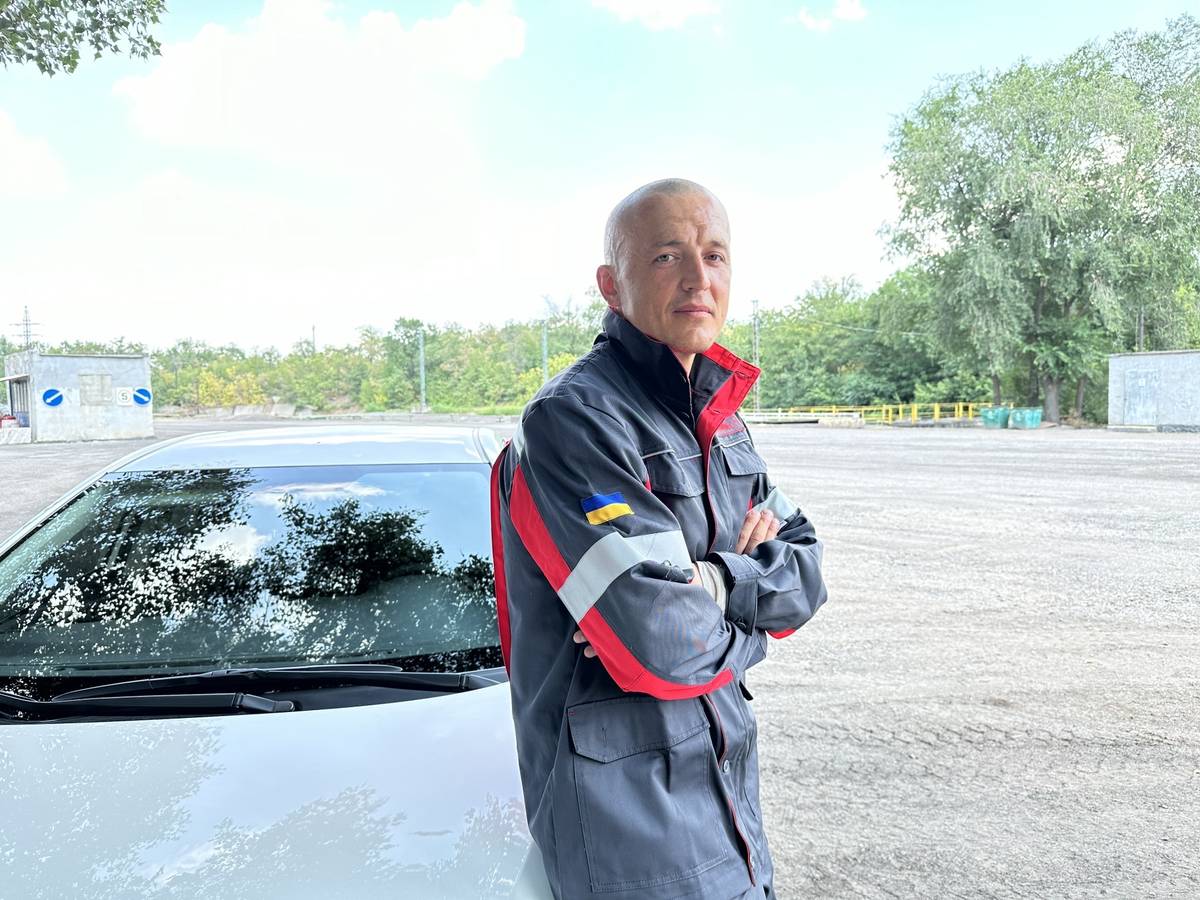
From 2017 to 2022, Serhiy Pavlov worked installing water and gas utility lines in Poland. Upon learning about Russia’s full-scale invasion, he immediately began planning his trip home and then to the front.
Support from loved ones is a soldier’s strength
On February 24, his beloved woke him up with the news of the war. Serhiy watched the news and was already planning his trip to Ukraine. However, he could not leave immediately as he had some matters to settle.
First, the couple started helping Ukrainian refugees fleeing the war: they opened a collection point for essentials near their home. Once everything was settled, Serhiy left. His motivation is simple: it is his duty.
“My obligation is the same as any man has in this country: to defend my homeland. First, we have family and parents here. Second, we grew up here.”
“If we want to call ourselves Ukrainians, we have to do something for it, despite many complaints that the state has given us nothing. But you are not defending the state. You are defending your homeland,” explains the veteran.
Serhiy’s beloved accepted his decision, did not dissuade him, and helped him pack. His mother in Ukraine also understood. Serhiy says such support is very important for a soldier; it calms and strengthens him.
“This support is very important at the beginning. I left feeling calm. Because you feel that you are doing this primarily for your relatives and loved ones. And when your decision is respected and accepted as worthy, it gives immense moral support,” explains the veteran.
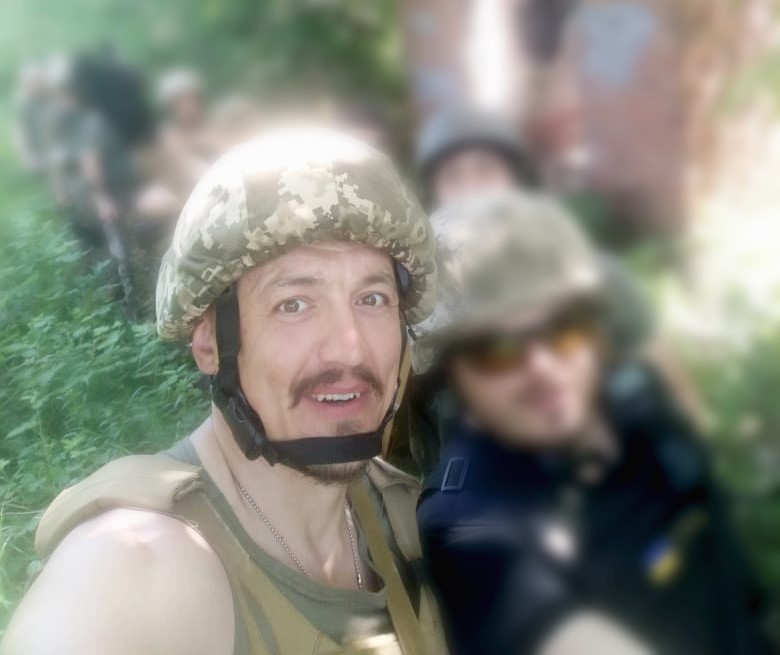
Returning to Kryvyi Rih from Poland in early March 2024, Serhiy Pavlov joined the local territorial defence. Later, he was transferred to the 93rd Separate Mechanized Brigade “Kholodny Yar
Return to Ukraine, service and injury
Serhiy returned to Ukraine at the beginning of March. He immediately went to see his ex-wife and daughter, wanting to send them to Poland.
Everything was prepared for this. However, they refused. After that, he went to the military enlistment office and, on March 12, was already in the local territorial defence unit.
“I was told that since I volunteered, I could choose where to fight. In the army, I served in the internal troops, which are now the National Guard of Ukraine. But since the National Guard was not operating in the Kryvyi Rih area, I asked to join either the Territorial Defence or the Armed Forces of Ukraine, as long as I could be close to the city. At that time, the Russians were already very close to our area, and I wanted to help defend it,” recalls Serhiy.
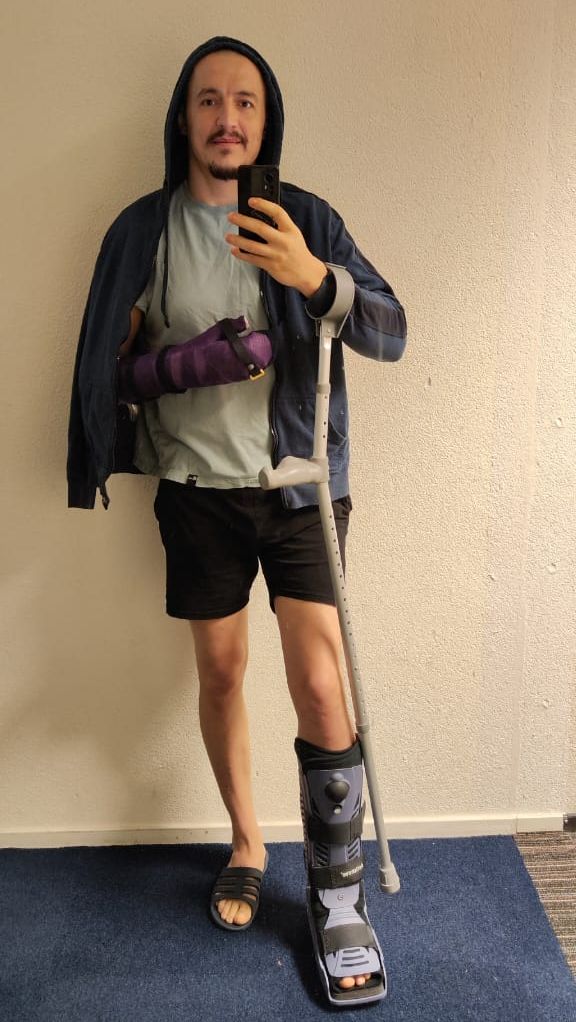
In the Donetsk sector, Serhiy received a gunshot wound to his left arm. According to the veteran, it was saved only thanks to his comrades who applied tourniquets and promptly evacuated him.
He was assigned to the security force at the military enlistment office. He admits he was not very happy with the assignment, as he wanted to be involved more actively. Later, he requested a transfer to a combat unit. That is how he found himself in the 93rd Separate Mechanized Brigade “Kholodny Yar”.
“Our unit holds only one sector: the Donetsk region. At that time, Bakhmut was still ours. We were involved in active fighting with the Wagner forces. While there are fewer of them there now, there was a large influx then. They were attacking us continuously, without pause,” recalls the soldier.
While Serhiy was assigned to be a gunner in the unit, he actually served as a machine gunner because there were not enough people. Their task was to hold positions. During one of the battles, he received a gunshot wound to his left arm.
“I was hit pretty badly. I barely pulled my arm out of the trench. Fortunately, it was saved thanks to my comrades.”
“They applied tourniquets to my arm and evacuated me more or less in time. Medics at the stabilisation point patched me up a bit and sent me further. Then, doctors at the Chernivtsi military hospital did almost the impossible at the beginning: they saved my arm, preventing an abscess. Thanks to them, I was evacuated to the Netherlands for further treatment. As a result, I have retained 50% use of my arm,” says Serhiy.
Adaptation to civilian life
Serhiy was demobilised in February 2024. He had been treated for almost a year and was classified with a moderate disability. Returning to civilian life was not problematic: his stay abroad, where he received great support from Ukrainian emigrants, helped.
“Thanks to the support I received, I gradually reintegrated into civilian life. After arriving in Ukraine, there were no difficulties except for bureaucracy. I think it should be possible to resolve certain issues without needing to bring a stack of papers,” says Serhiy.
For example, he mentions the process of obtaining a disability pension. He says he submitted documents in February, but it still has not been granted.
“They send many requests, and responses often don’t come. That’s why I say there’s a lot of bureaucracy. You need to bring many papers. It’s good that only my arm is injured. I can walk, drive and run back and forth between various offices. But what about someone without a leg? The system is not designed for people with disabilities,” says Serhiy.
To his fellow veterans returning to civilian life, Serhiy advises not to get nervous and to accept society as it is. “You have to understand that society won’t adjust to veterans. Those who return should understand that they have to adapt to it. And it is what it is, unchangeable. Don’t pay attention to radical opinions. I have friends who don’t speak well of the military enlistment office. There’s nothing you can do about that... You should also expect that almost every community has passive people waiting for someone else to act,” warns the veteran.
Found a job via an advertisement
While processing his pension and gathering documents, Serhiy thought about how he could earn a living. He did not have many options, as his arm still does not bend well and his fingers do not move fully. He decided to become a driver, since he could hold the steering wheel.
While browsing job information online, Serhiy came across an advertisement from Metinvest; Inhulets Iron Ore needed drivers. He thought, why not?
According to Serhiy, he was treated very loyally during the hiring process. His manager, Vyacheslav Kolomoyets, who heads the automotive department at Metinvest Group’s Inhulets Iron Ore facility, describes him as a sincere, open person and a responsible worker.
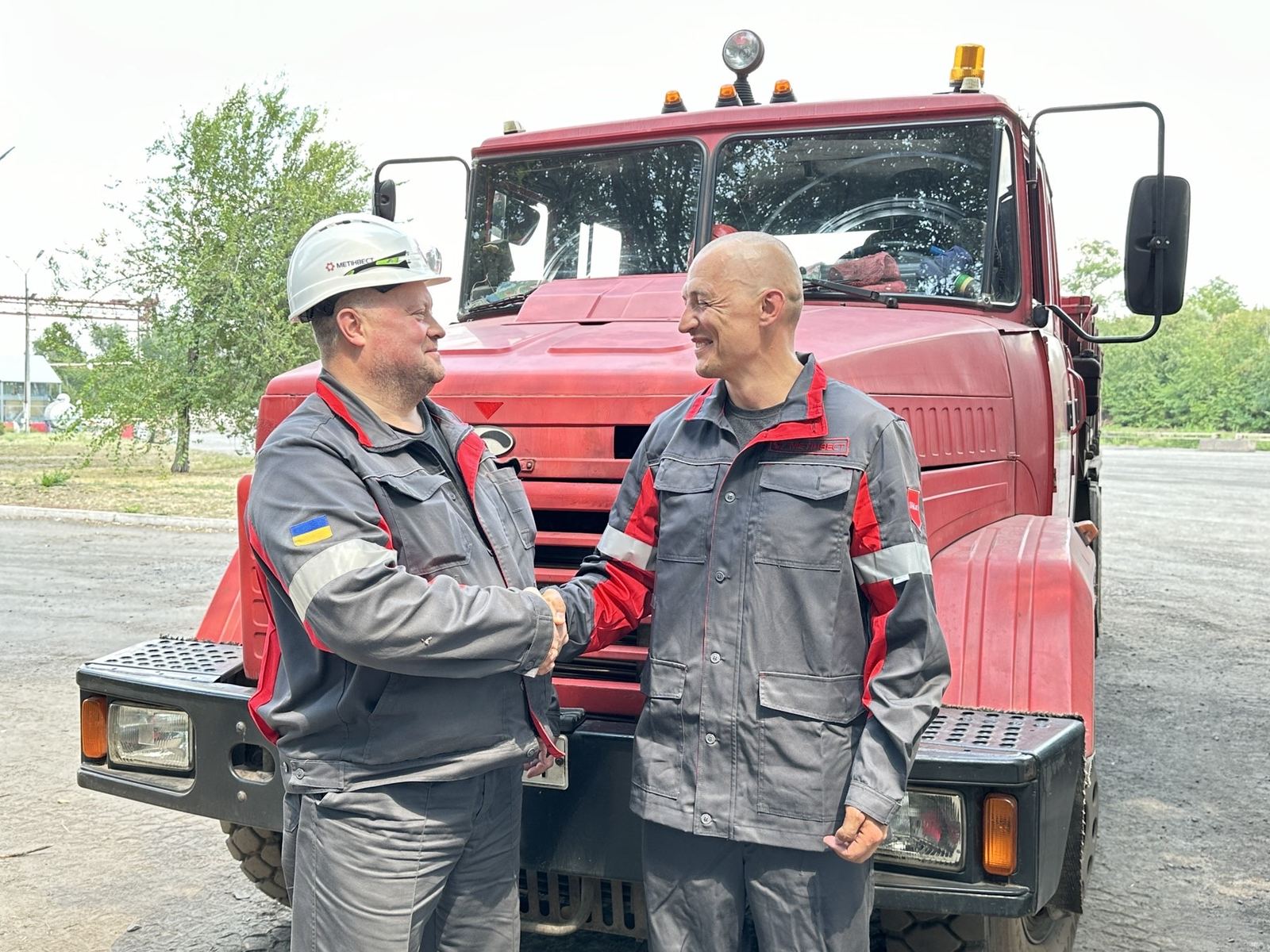
Serhiy saw an online advertisement for a job as a driver at Inhulets Iron Ore. In March 2024, he started working at the plant
“Serhiy Pavlov joined our department in March 2024. He’s a very sincere and open guy. He immediately fit harmoniously into the team, as if he had been with us for many years. After all the complex operations and rehabilitation, he wanted to work and be useful more than anything else. Serhiy is very responsible and punctual, looks after the equipment. It’s clear that he has combat experience. You can count on him in any situation,” says the manager.
Serhiy has formed normal, working relationships with the team. He has already taken advantage of some benefits.
“At the plant, there’s an opportunity to take unscheduled leave. I have booked it. I’ll go pick up my beloved from Poland. With my moderate disability, I receive a 50% discount on train and bus tickets once a year. But, as practice showed, there are problems with this. I bought a ticket to Poland, and they didn’t want to give me this discount. But just as I was getting ready to call the Ukrainian Railways hotline, they approved it. Also, there’s a programme for veterans in our city: they have the right to visit sports facilities for free. But I haven’t checked it out yet,” the veteran says, describing some of the benefits he has earned.
Adaptation programmes for veterans
Since the beginning of the full-scale invasion, over 3,000 employees of Metinvest’s mining and processing facilities in Kryvyi Rih have joined Ukraine’s defence forces. Now, many of them are returning to work.
According to Andrii Shcherbak, Director of Personnel and Social Affairs at Inhulets Iron Ore, the main task of their department is to help employees adapt to civilian life and working conditions.
To achieve this, they have identified the following areas of work:
- Returning and retaining internal veterans, and attracting and hiring external veterans.
- Offering legal support to mobilised and demobilised employees.
- Providing targeted financial assistance for all employees affected by the war.
- Promoting well-being through programmes that offer psychological support for employees and their families, psycho-emotional rehabilitation, and access to additional medical examinations.
- Preparing managers and teams for the return of veterans through special training programmes.
- Assisting veterans through professional adaptation and development programmes: retraining programmes, free retraining for veterans who cannot return to their previous positions, and preferential admission to Metinvest Polytechnic.
- Fostering the social adaptation and engagement of demobilised personnel in veteran initiatives.
“We are ready to hire external veterans in the labour market to enhance our workforce with new management and teamwork experience and new competencies. Today, Metinvest offers a wide range of vacancies and is ready to hire and train those who want to join our team,” says Andrii Shcherbak.
